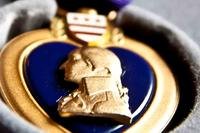After a biking accident five years ago, Mark, a retired Army officer, didn’t fully grasp the seriousness of his injuries. In his daze, he felt certain he was going to recover.
But the accident left him paralyzed from his neck down and bedridden. He was uncertain if he would ever taste food again. Right after his accident he relied on a feeding tube, and it took time and therapy to learn to swallow again.
It was stark change. Before the accident, he had competed in the Pikes Peak Ascent at age 75 and biked long distances.
In his lengthy recovery, each milestone has led to the next. Getting out of bed led to using a wheelchair, he explained.
He also works hard to stay upbeat — for every negative thought, he tries to have two positive thoughts, he said.
“You have to think in terms of 'how lucky I am,'” he said.
For instance, he is grateful the accident happened later in his life after two successful careers.
Mark shared his story to help highlight the health care and assistance available to other veterans, but he did not feel comfortable sharing his last name because of the pending cuts to the Department of Veterans Affairs.
He told his story while his caregiver John Bright lifted his coffee cup to his lips and he sipped it through a straw. He likes to call his caregivers life givers, he said with a smile.
The Vietnam War-era Army officer moved to Colorado to be near his daughters and their families and he still lives with his wife of 67 years in their Monument home among the evergreen trees.
Now, he navigates his home in a wheelchair he learned to use with his head and legs, only recently transitioning to using his hand on the joystick, which allows for a smoother ride, he said.
His team of about five caregivers help with regular daily tasks, but he doesn’t need 24/7 care anymore.
With their help, determination and excellent care through the VA, he’s made huge strides, he said.
He can stand, ride a stationary bike, walk with a walker and assistance, and move his feet as if he is running.
But life is still full of daily battles, he said. It can be tough for an officer trained for battle to struggle with simple tasks, such as getting a sip of water from a tube in front of his face.
In a short story, he explained the frustration of spending an hour at 2 a.m. trying to get a sip of water, only to have the straw slip away because it was at the wrong angle.
When he did finally sip the water and it flooded down his throat, water had never tasted so good, he wrote.
The care at the VA has been critical to such progress because when his daughter was trying to find care for him after the accident, she called a hospital that specializes in spinal cord injuries to see if they would be a good option, but they told them Mark was too old for care.
“I feel extremely fortunate to have VA support. Without it right now, I don't know where I'd be,” Mark said.
In his final chapter of life at 89, he is trying to apply a key principle of racing, finishing strong and picking up speed ahead of the finish line.
“I want to try to not only do things I didn't think possible, but to help others in my position,” he said.
© 2025 The Gazette (Colorado Springs, Colo.). Visit www.gazette.com. Distributed by Tribune Content Agency, LLC.











